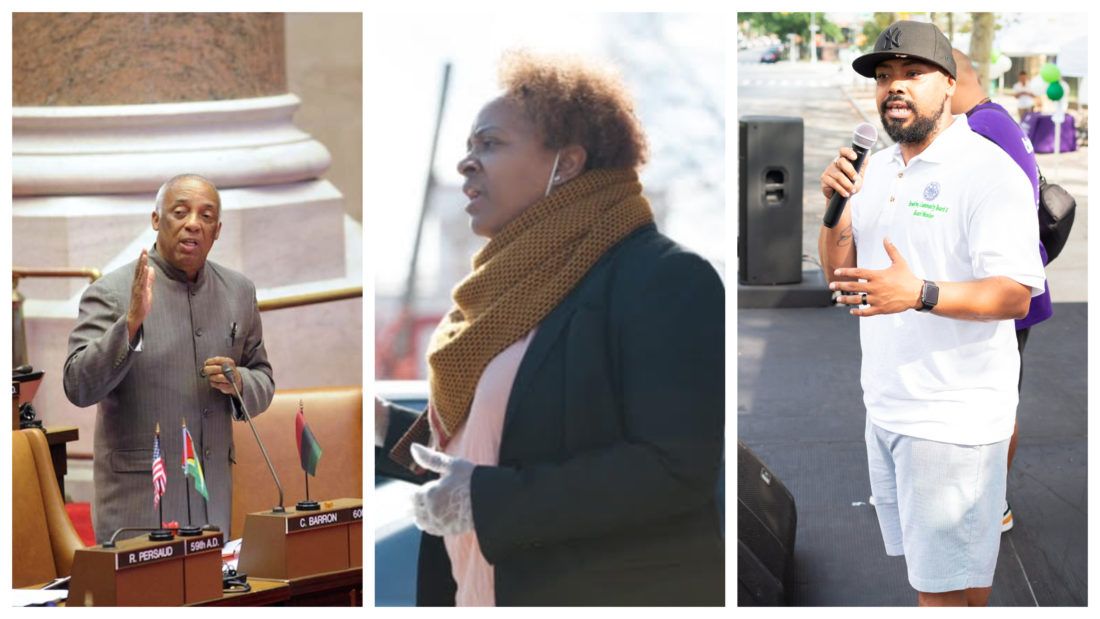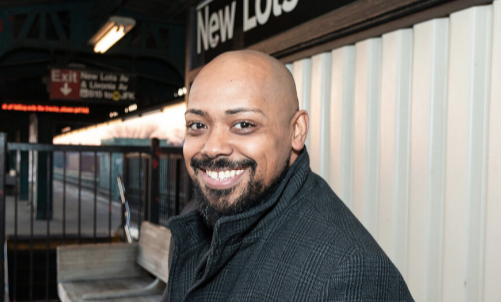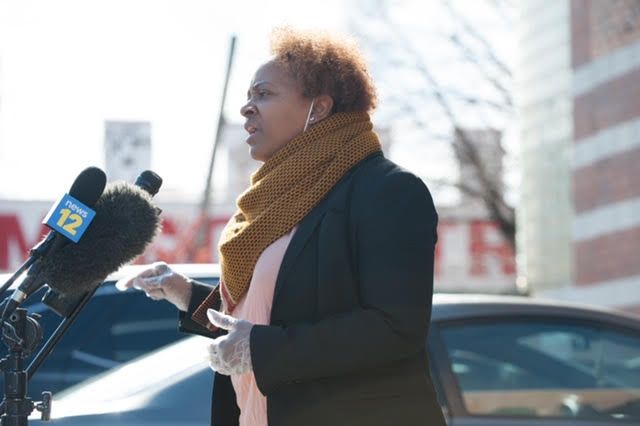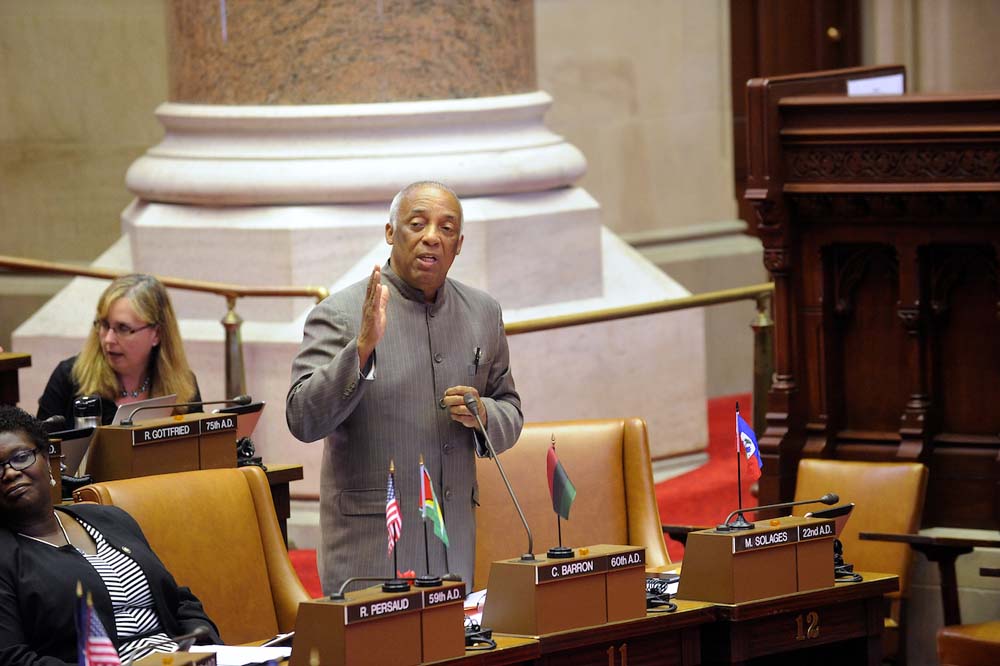How Candidates for East New York’s 42nd Council District Would Re-Think Policing and Safety


Amidst the well-documented increase in gun violence across New York City last year, one area stood out: the NYPD’s 75th Precinct, which includes the neighborhoods of East New York and Cypress Hills, had both the most shooting incidents and the highest number of police misconduct complaints of anywhere in the city.
The precinct had 102 shootings last year, up from 51 the year before. At the same time, the 75th led the city in complaints to the Civilian Complaint Review Board (CCRB), and in recent years was the subject of at least 90 lawsuits. Worse, officers with substantiated complaints often received promotions and raises instead of punishment.
Last week, Bklyner asked East New York activists and community leaders what they thought needed to happen to re-imagine policing and public safety in their neighborhood.
Now, we’re sharing the thoughts of the candidates running in this year’s elections to represent the area in the City Council. In the 42nd Council District, which overlaps with the southern half of the precinct, incumbent Inez Barron is term-limited but could be replaced by her husband, Assembly Member Charles Barron. He’ll battle against Nikki Lucas, Wilfredo Florentino, and Gena Watson in this year’s local elections.
Bklyner spoke with Barron, Lucas, and Florentino (Watson could not be reached), who, frankly, agreed on many criminal justice reforms. They all support giving more authority to the CCRB, requiring cops to live within the city limits, and giving communities a role in choosing their precinct’s commanding officer.
Read on for more detail on each of their approaches to the twin issues of policing and public safety.
Wilfredo Florentino

Florentino’s engagement with ideas about justice and safety extends beyond the realm of policy: he and his husband, Kareem Nemley, launched East New York’s Rooted Theater Company with a 1930s play about a man arrested for a murder he did not commit.
Florentino, who works as a grants manager for the NAACP and was previously a staffer for former Council Member Diana Reina, calls himself “an equity and justice Democrat,” and, in an interview with Bklyner, he framed East New York’s challenges with gun violence in that context.
“The City Council has failed at addressing gun violence,” he said. “We can’t look at reducing gun violence in a bubble. It is a result of a system that is built to work against us. Communities like ours in East New York and Brownsville face systematic racism, disenfranchisement, and disinvestment.”
“Policies,” he continued, “must include prevention, intervention, and expanded access to high quality, culturally competent, coordinated, social, emotional, and mental health services.”
He described the relationship between residents and officers as “an imbalance between community-led and police efforts to guarantee public safety,” and called on the Council to support “community-led de-escalation programs” and to “prioritize community planning, implementation, and oversight of comprehensive safety plans.”
While all the candidates in the race said they supported reshaping the CCRB to allow the public to elect its members and to give it disciplinary authority over officers (currently, NYPD brass has the final say), Florentino has been particularly vocal about the subject. He published a Brooklyn Reader op-ed on the subject last May and circulated a petition signed by 37 other Council candidates pushing for the change.
“When victims of police misconduct file a complaint with the current Civilian Complaint Review Board (CCRB),” the petition reads, “they quickly realize that it’s a dead end.”
In interviews, Florentino frequently cites his eight years of military service, and he called it “unconscionable that the NYPD’s budget includes weapons of war.” He said he supported removing $1 billion from the NYPD budget but expressed frustration that the “accountability structure isn’t always made clear when talking about defunding.”
“We must eliminate the NYPD’s involvement in social services, traffic enforcement, school safety,” he said, though he also said he supports adding the workers who deal with those issues to those covered by the state’s Penal Law 120.05, which would make assaults against them a felony.
“Black folks must live with the daily possibility that we may lose our lives for simply existing,” Florentino concluded. “This reality is part of a much larger social dilemma, lack of housing, health resources, jobs, and opportunity. We have to stand against the over-policing and militarization of Black and Brown communities by supporting the whole person, through justice, liberty and equitable policies.”
Nikki Lucas

Lucas is a long-time resident of Starrett City, the massive private development of apartment towers that sits on the 75th Precinct’s southern tip but is primarily patrolled by a private security force; one resident told WNYC in 2016 that she’d “never seen them stop or arrest anybody. Instead, I see them talking to people, young and old.”
While city data showed four shootings in the complex last year, Starrett City is generally regarded as being safer than the neighborhood that surrounds it.
When Bklyner asked whether the Starrett City security force informed her thinking about public safety, Lucas said, “living in Starrett City with proper lighting and security definitely gives the residents a sense of protection, without being ‘policed.’ The security within Starrett City is community-friendly. They are there for our events, and they know the residents. It makes a huge difference. I can say it is a good example of what public safety should be.”
Nevertheless, Lucas told Streetsblog NYC this month that she had “physically watched police harass kids for riding [bikes] on sidewalks, which points to the need for a bike lane.”
Lucas, who currently works at the nonprofit Senior Outreach Services of New York and hosts an online video series, told Bklyner she wants to create an Elected Civilian Review Board that has “real teeth to it, with the power to have officers removed from the NYPD.” She also pitched the idea of a three-strike rule for weeding out officers that should not be on the force.
“If an officer has 3 substantiated misconduct complaints by an Elected CCRB, then that officer should be removed,” she said. “We should not wait until an officer chokes someone or shoots someone to death and then find out that they had 10, 20, or sometimes 30 complaints. How can someone with 20 complaints remain on the force? That’s insane.”
Lucas said the 75th Precinct’s officers look “at every member of the community as a criminal,” she sees a disparity in the way the NYPD engages with different parts of the city: “East New York is being policed,” she said, “while other neighborhoods are protected.”
Officers spend too much time “writing tickets or harassing residents,” Lucas argued, which prevents officers from “fighting real crime.”
“The NYPD should not be a revenue-producing agency for the city,” she said. “Currently, the city depends on the revenue that the NYPD generates through tickets, which actually leads to harassment because officers are trying to meet quotas, which we know exist.”
Rather than defund the police, Lucas said she prefers to talk about “reallocating the New York City budget” and called the city “notorious for being wasteful in every agency.”
“I can definitely say that funds should be allocated to Mental Health, particularly when we are talking about situations when police are called because someone is in distress, mentally,” she continued. “The NYPD is not trained to handle these situations. If we have a Mental Health department, specifically to deal with distress calls, especially from family members, about someone needing mental assistance, with the NYPD acting in a secondary role.”
She was sharp in her criticism of the Barrons, saying that “elected officials in the area have not come up with any ideas in the past 20 years, so I would be delusional to think they would have ideas now.”
As a Council Member, she said she would push the Council to invest in “career opportunities, educational resources that involve both academic and enrichment including an investment for parental support and family support,” as well as the “creation of school-based health centers to focus on preventive care and mental wellness and investment in true sustainable housing for every student.”
Charles Barron

Barron, to put it lightly, is skeptical of the NYPD.
“If I were walking down the street at night, and I saw on one side of the block, black youth with hip-hop clothing, and on the other side, I saw white officers or even black officers, I’m going down the side where black youth are,” Barron said. “I feel safer doing that.”
For Barron, who served in the Council seat for 12 years before being elected to the State Assembly in 2014, the phrase “defund the police” has started to ring hollow.
“The Mayor and Commissioner said that, and then they just transferred money around,” said Barron. “We need to approach crime differently. Yes, take money out of the $6 billion NYPD budget and put it in health, youth services, absolutely. But the NYPD needs to be dismantled and re-organized. Safety should be controlled by us, and how we deal with crime should be led by people, churches, community-based organizations, and cure violence organizations. Not by the institutions that are in place now.”
Barron said the 75th Precinct’s current commanding officer Inspector John Mastronardi was “not in touch with the realities of our community, and therefore police are not going to be properly disciplined.”
But while he would like to see the community have the power to select a commanding officer who is “sensitive to what’s actually going on,” he’s quick to talk bigger. In addition to an elected CCRB and a special prosecutor for police misconduct, Barron said he wants to require officers to live within city limits and to require public grand juries for misconduct cases because “we don’t seem to be able to get indictments on police.”
“I propose a radical, revolutionary change,” Barron proclaimed. “The police should be controlled by us, and how we deal with crime should be led by people, churches, community-based organizations, cure violence organizations,” citing the entity Man Up as one successful model.
He’s also pushed for a “reparations bill” that would establish a “state community commission on reparations remedies” to study the lasting impact of slavery and discrimination on African-Americans and to make recommendations on a government response.
As for gun violence, Barron said “no amount of police containment” would decrease it without “economic development, job creation, and a massive attack on poverty.”
“Whenever there’s high poverty, there’s going to be high crime,” he said. “We need an economic approach toward dealing with crime. Over the years, we’ve continued to bring more jobs and economic development, and for a while, crime was going down.” Barron cited his role in creating the Prince Joshua Avitto Community Center and the Gateway Center Mall as examples of that type of approach.
“I think that we need to have community land trusts instead of giving away to developers,” he added. “Just like you give these developers land for dirt cheap, do the same thing for the community and say, ‘you can own this land,’ and give us access to subsidies. When we get money from the system, it’s welfare. When the rich get money, it’s subsidies.”
New York City’s Democratic primary election is on June 23rd. Learn more here.




